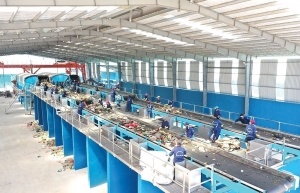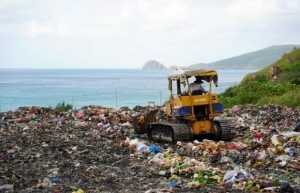EPR promotes the recycling of automobiles and motorbikes
Statistics published by the Vietnam Register Department show that from January, the total number of expired cars is over 21,000 across the country. Around 6,000 of those are passenger vehicles, while the remainder are goods units.
 |
| Nguyen Thi, Senior legal expert Department of Legal Affairs Ministry of Natural Resources and Environment |
However, according to the Vietnam Automobile Manufacturers Association and Vietnam Association of Motorcycle Manufacturers, manufacturers and exporters have yet to implement the recall and handling of vehicles following the provisions of the Law on Environmental Protection in 2005 and 2014. This work is mainly done by the junkyard and craft village system, which does not ensure effectiveness and causes environmental pollution.
There are many reasons why recovery and recycling of motorbikes and cars in this country still limited. Firstly, it is understandable that people want to use their vehicles for as long as possible.
Another important reason comes from the policy system. The policy for managing cars and motorbikes still has many shortcomings, including a lack of regulations on mandatory termination of circulation and a lack of regulations on taxes on vehicles. People just need to spend a (relatively large) amount of money buying a car or motorbike and then use them without worrying too much about financial obligations.
One thing to note is that owning a car or motorbike is the property of each individual or organisation, so it is protected by the constitution. Thus, the owner cannot be arbitrarily forced to give it up unless there are violations that require deprivation of ownership rights according to the provisions of the law.
Furthermore, there is no car and motorbike recycling policy in Vietnam, and there is a lack of mechanisms to encourage users to bring their vehicles for recycling. If the value of the transfer to the recycler is determined satisfactorily, it is completely possible to recycle outdated or worn-out cars and motorbikes.
Because of this, the number of high-value recycled cars and motorbikes in our country is not high, so the recycling industry for these products cannot be developed.
From the practice in many countries, applying EPR strongly promotes the vehicle and motorbike recycling industry, achieving high specialisation and professionalism.
To fulfil this responsibility, producers and importers can introduce measures to encourage recycling by owners of vehicles, such as buying old vehicles or applying incentives and promotions when buying new ones. At the same time, we must support recyclers to carry out effective dismantling, reuse, recycling, and disposal of vehicles, achieving mandatory recycling specifications and mandatory recycling rates at the lowest cost.
However, only having an EPR policy is not enough. It is also necessary to have policies on managing cars and motorbikes that are strong enough to create a synergistic force to promote the recovery of old and worn-out vehicles.
This includes policies on taxes and fees for cars and motorbikes. We need to consider cars as a necessary vehicle for protecting people’s lives and health, instead of luxury goods. Instead of imposing a special consumption tax, we could impose a progressive tax according to the year of use; car ownership tax for second and subsequent years, or fees based on year of use.
Eliminating the special consumption tax will reduce car prices, while applying progressive taxes, second vehicle ownership taxes, or year-of-use fees will encourage owners to easily have their vehicles demolished instead of continuing to use them. As in South Korea, people have to pay an annual car use tax. For cars not used for business purposes, they also have to pay a local education tax.
In addition, it is necessary to regulate cases in which vehicles must be dismantled, recycled, and treated like the South Korean model in cases of abandonment of ownership, derelict vehicles, and confiscated vehicles. Strict regulations force vehicles to meet environmental protection requirements and strengthen supervision and enforcement to ensure the effectiveness and efficiency of the regulations.
In addition, there needs to be policies to support the formation of a professional and modern automobile and motorbike recycling industry. It needs to have large centres to purchase vehicles for demolition. These centres are allowed by the state to carry out vehicle inspections and have the authority to issue certificates of actual demolished vehicles as a basis for cancelling vehicle registration to avoid paying tax on a second or more vehicles.
From these demolition centres, vehicle parts will be reused and other parts can be recycled or processed in a continuous chain, which is connected to create a circular resource value chain. This is a critical factor to be able to implement EPR for vehicle recovery and handling. With this policy, we will make an important contribution to solving many current problems, such as pollution in craft villages, unemployment, the circulation of outdated cars and motorbikes, environmental pollution, and traffic accidents.
Along with that, we need to promote the role of producers and importers of cars and motorbikes in shaping the recycling industry because they are both the first and last step of this value chain.
 | EPR clarity sought to keep costs low The business community has called for clearer criteria regarding extended producer responsibility in Vietnam that considers international standards and legal status. |
 | EPR fees to add to plastic companies' bills Although the Environmental Producer Responsibility (EPR) scheme could create an incentive for the phase-out of eco-unfriendly and non-recyclable packaging in the long term, it would shift the heavy financial burden for end-of-life waste management from municipalities to producers and importers. |
What the stars mean:
★ Poor ★ ★ Promising ★★★ Good ★★★★ Very good ★★★★★ Exceptional
Related Contents
Latest News
More News
- Vietnam enters new development era: Russian scholar (January 25, 2026 | 10:08)
- 14th National Party Congress marks new era, expands Vietnam’s global role: Australian scholar (January 25, 2026 | 09:54)
- French Communist Party highlights 14th National Party Congress as strategic milestone (January 23, 2026 | 09:19)
- Leaders must rediscover discipline of engagement (January 22, 2026 | 11:08)
- IP alterations shape asset strategies for local investors (January 22, 2026 | 10:00)
- 14th National Party Congress: Vietnam - positive factor for peace, sustainable development (January 22, 2026 | 09:46)
- Japanese legislator confident in CPV's role in advancing Vietnam’s growth (January 22, 2026 | 09:30)
- 14th National Party Congress: France-based scholar singles out institutional reform as key breakthrough (January 21, 2026 | 09:59)
- 14th National Party Congress: Promoting OV's role in driving sustainable development (January 20, 2026 | 09:31)
- 14th National Party Congress affirms Party’s leadership role, Vietnam’s right to self-determined development (January 20, 2026 | 09:27)

 Tag:
Tag:



















 Mobile Version
Mobile Version